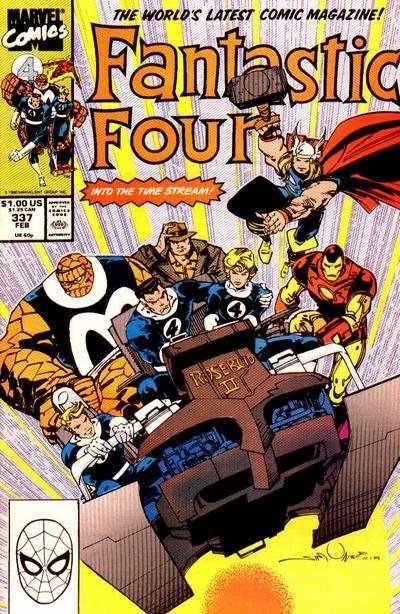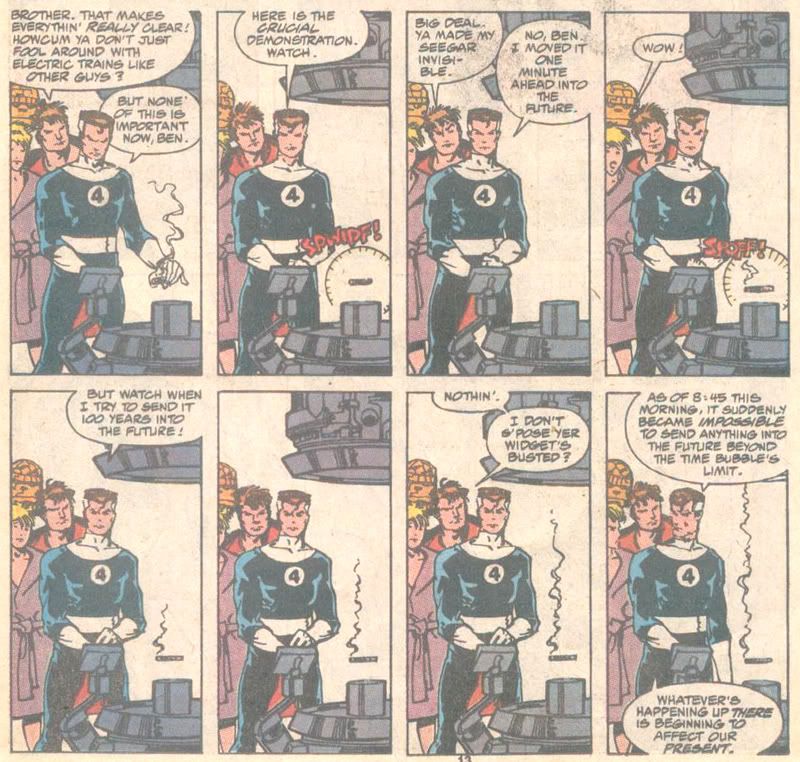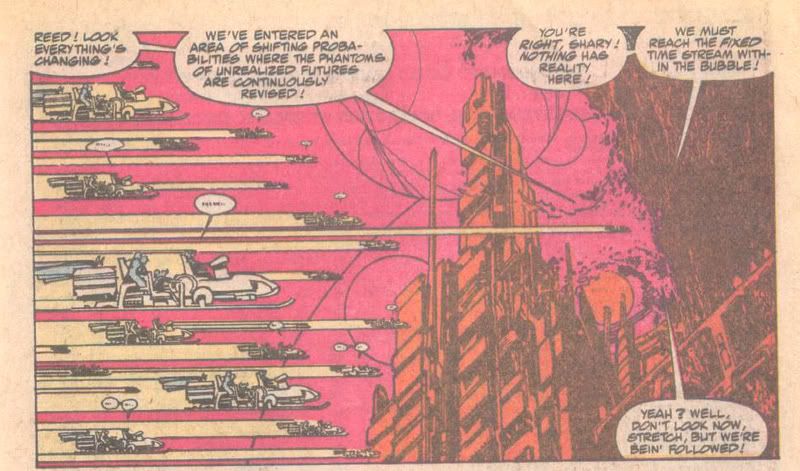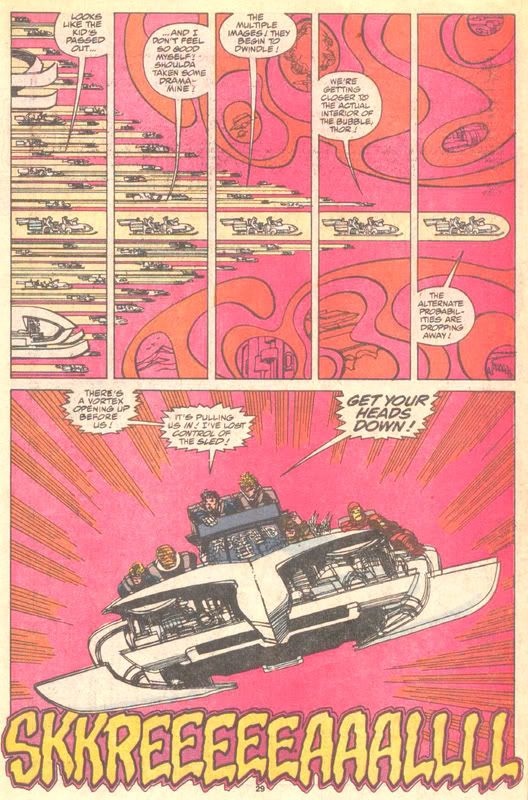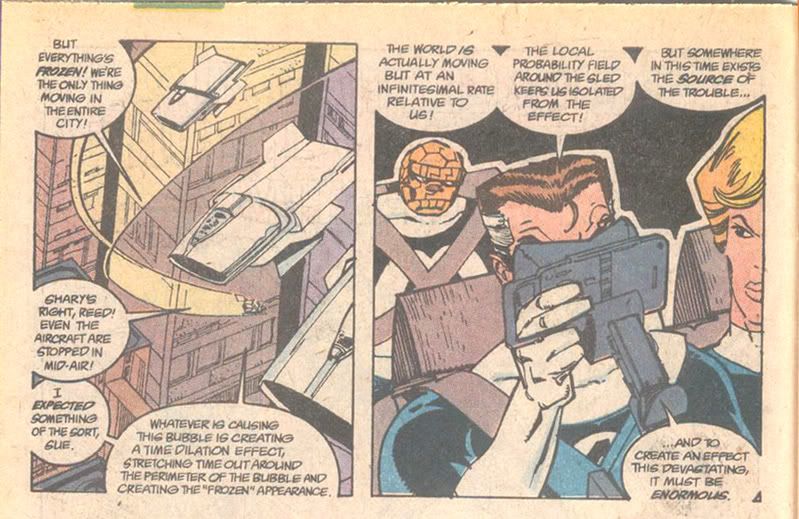Once upon a time (1984), a large comic book company (Marvel) decided it would be really, really cool to have all their best heroes band together and fight all their most powerful villains in an all-out extravaganza slugfest.
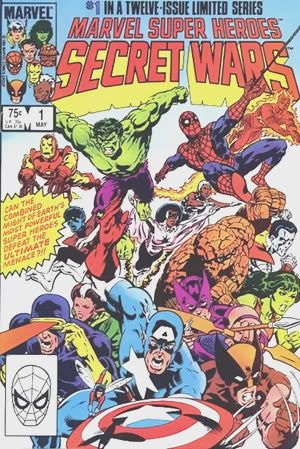
The real purpose of it was to promote a line of Marvel action figures to be associated with the title: Marvel Super Heroes: Secret Wars. But a funny thing happened - they actually managed to make a decent story and heighten anticipation for the series using a very LOST-like technique: Flashbacks.
Every hero that took part in Secret Wars disappeared at the end of one of their own issues in normal continuity. Next issue, they all returned, having spent months on another planet engaged in this battle and alluding to events that happened there, but no one knew anything because the Secret Wars comic wasn't out yet! In fact, the twelve issues of SW came out over the course of a year, so fans really didn't find out what happened to everyone until a year later. Some characters returned significantly changed: Spider-Man came home with a shiny, new black costume. Colossus had an affair while he was away and broke up with Kitty Pryde shortly after. The Thing didn't return at all, with the She-Hulk taking his place in the Fantastic Four.
The heroes were taken away by a powerful entity "from beyond" they dubbed The Beyonder. He told them, both heroes and villains, that if they defeat their enemies "all they desire would be granted." A lot happens over the course of the series, but for our LOST purposes, here's what you need to know:
1) The Beyonder is all-powerful, capable of doing just about anything. Creating mass, manipulating space-time, an omniscient, sentient being about as close to a god as you can come.
2) During the course of the series, Dr. Doom manages to steal the Beyonder's power, becoming a god-like figure himself. He uses the power to kill all the heroes with a single "bolt from the blue."

3) However, Doom is eventually overcome by the power inside him. The weakened Beyonder (who hangs out by Doom's side, waiting for an opportunity) manages to trick him into restoring the heroes by placing doubts in his mind. Doom then loses total control and the Beyonder snatches his power back. In revenge, he banishes Dr. Doom "across the reaches of time and space" - to where, nobody knew.
The Beyonder reminds me very much of what Ben describes as the Magic Box on the Island: something that can grant your every desire, just by thinking about it. Later on in the Marvel Universe, it's revealed that the Beyonder is in actuality a Cosmic Cube (something also very much like a Magic Box) that, in the same accident that created the Molecule Man, gained sentience. Part of the Cosmic Cube's power went to Owen Reece who then became one of the Fantastic Four's greatest villains. The remainder eventually became the Beyonder.
The problem with power like the Beyonder's is that, as Doom found out, very few people have the mental strength to wield it without destroying a planet with every stray thought (Thanos also encountered this problem when he finally assembled the Infinity Gauntlet). This was one of the reasons I thought Ben wanted Walt. Perhaps Ben can't properly use the Magic Box - for all his vaunted intelligence, he simply doesn't have the right type of mind to manipulate the energies it contains. That's why DHARMA was interested in psychic research and it's why Ben had Walt kidnapped. However, Walt proved to be too powerful for Ben to use and he eventually abandoned his plan.
But the really interesting thing to me about the Secret Wars was that at the time that story took place in Marvel continuity, the story's main antagonist, Dr. Doom, as he appeared in the Secret Wars, was dead. In reality, his body had been destroyed, but he mind-swapped (don't ask) with an innocent bystander right before the explosion. This certainly wasn't the case in the Secret Wars comic where he appeared to be perfectly normal (as normal as Dr. Doom can be) and Reed even commented on the fact that he thought Doom was dead. This discrepancy wasn't resolved until years later in one of my favorite comics of all time: Fantastic Four #288.
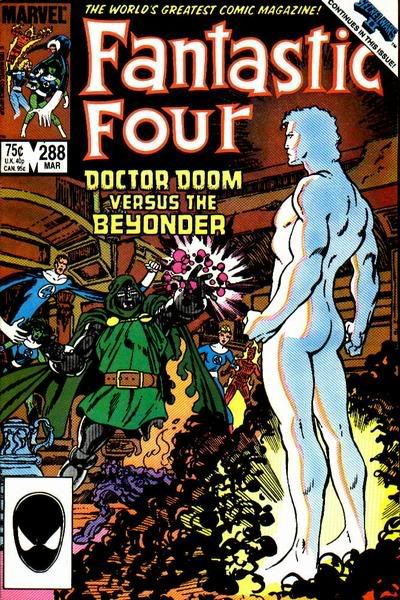
The comic begins with Doom, who's mind is still trapped in the innocent bystander from before, capturing the Fantastic Four. The team at this time includes the She-Hulk, who, oddly, Doom says he's never met before, despite the fact he clearly battled her in the Secret Wars.
With the FF caged up, Doom attempts through sorcery to re-create his original body, but the spell he attempts to cast fails. He then tries and succeeds in summoning "the greatest power in the universe," who just happens to be The Beyonder (biggie version here):
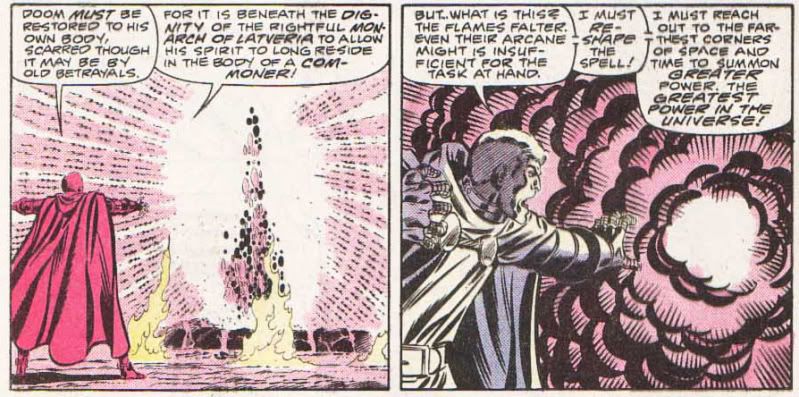
Just as before, Doom doesn't recognize The Beyonder and, equally strange, The Beyonder doesn't recognize Doom either. The Beyonder gets ready to obliterate Doom when Reed convinces him to wait. After some querying, Reed discovers that the Beyonder doesn't recognize Doom because he's in a different body from the one that was in the Secret Wars (biggie):
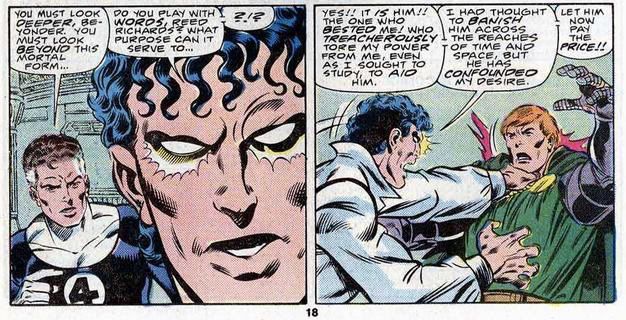
Realizing who Doom really is, the Beyonder gets even MORE pissed and tries again to destroy Doom, only to be persuaded again by Reed, who finally puts 2 + 2 together, to wait (biggie):
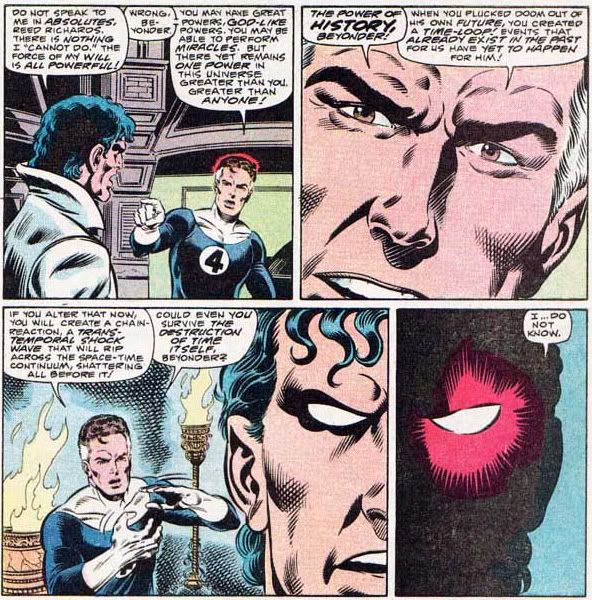
Turns out, The Beyonder created a time-loop when he began the Secret Wars. Doom was destroyed in normal Marvel continuity, so he took Doom from a future point in the time stream, a point where Doom was in his normal body. That's why Doom didn't recognize the Beyonder because all the events of the Secret Wars were yet to happen for him. Reed points out that if the Beyonder were to destroy Doom now, it would likely rip apart the space-time continuum.
Thus, the only way to repair things and close the time-loop is for the Beyonder to cooperate with his past self, reconstruct Doom's body as it was and send him back to the start of the Secret Wars. And this is exactly what the Beyonder does (biggie):
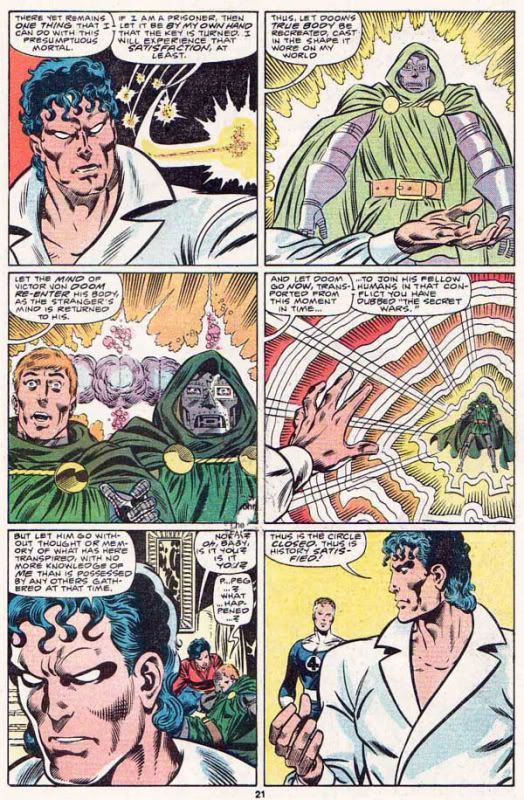
This is a perfect example of what I think is going to happen on LOST (that I described in my last post). The Losties have created a time loop by going back to 1977. However, they won't go back to 1977 unless they all get on Flight 815. Thus all the time travelers (who have knowledge of the future) have to act and ensure that their past selves get on that flight in 2004. If they fail to do so, space-time will be ripped apart and, as Ms. Hawking stated, everyone will die.
At the end of the issue, Reed warns the others that because the time loop has now been closed, Doom may very well reappear right in front of them (biggie):
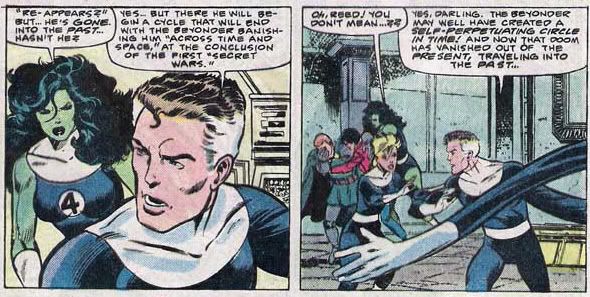
And sure enough, the very last panel shows Doom reappearing in the very room the Beyonder banished him (biggie)
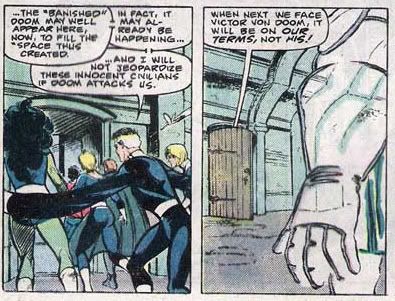
Thus, the Beyonder at the end of the Secret Wars banished Doom across space and time back to the very moment he snatched him from, completing the circle.
How will LOST end? How about a montage of all the Losties, most now in their sixties, watching their younger counterparts board Flight 815 from afar, thus ensuring the space-time continuum won't be ripped apart? They could call it "Full Circle" or, more likely perhaps, "Ouroboros." Probably won't happen, but that's my current prediction, not that it explains Smokey at all.
Of course, he's probably just Galactus in disguise. :)

